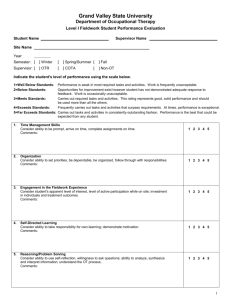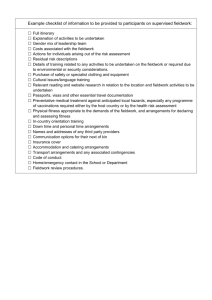Anthropology 101 Fieldwork Assignment
advertisement
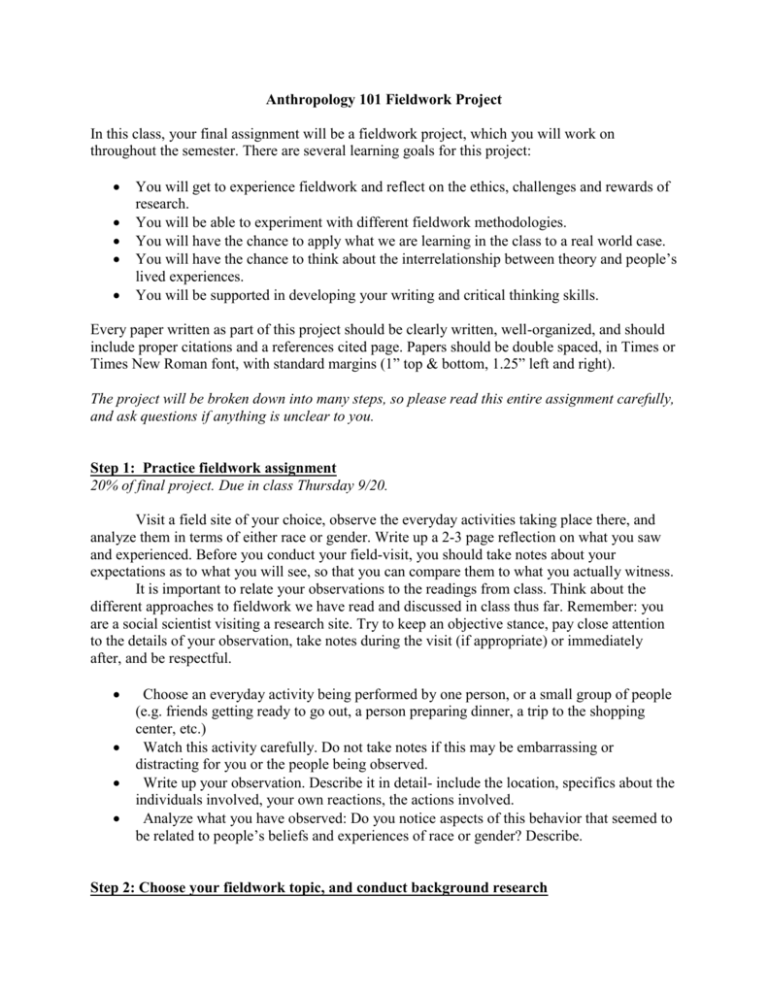
Anthropology 101 Fieldwork Project In this class, your final assignment will be a fieldwork project, which you will work on throughout the semester. There are several learning goals for this project: You will get to experience fieldwork and reflect on the ethics, challenges and rewards of research. You will be able to experiment with different fieldwork methodologies. You will have the chance to apply what we are learning in the class to a real world case. You will have the chance to think about the interrelationship between theory and people’s lived experiences. You will be supported in developing your writing and critical thinking skills. Every paper written as part of this project should be clearly written, well-organized, and should include proper citations and a references cited page. Papers should be double spaced, in Times or Times New Roman font, with standard margins (1” top & bottom, 1.25” left and right). The project will be broken down into many steps, so please read this entire assignment carefully, and ask questions if anything is unclear to you. Step 1: Practice fieldwork assignment 20% of final project. Due in class Thursday 9/20. Visit a field site of your choice, observe the everyday activities taking place there, and analyze them in terms of either race or gender. Write up a 2-3 page reflection on what you saw and experienced. Before you conduct your field-visit, you should take notes about your expectations as to what you will see, so that you can compare them to what you actually witness. It is important to relate your observations to the readings from class. Think about the different approaches to fieldwork we have read and discussed in class thus far. Remember: you are a social scientist visiting a research site. Try to keep an objective stance, pay close attention to the details of your observation, take notes during the visit (if appropriate) or immediately after, and be respectful. Choose an everyday activity being performed by one person, or a small group of people (e.g. friends getting ready to go out, a person preparing dinner, a trip to the shopping center, etc.) Watch this activity carefully. Do not take notes if this may be embarrassing or distracting for you or the people being observed. Write up your observation. Describe it in detail- include the location, specifics about the individuals involved, your own reactions, the actions involved. Analyze what you have observed: Do you notice aspects of this behavior that seemed to be related to people’s beliefs and experiences of race or gender? Describe. Step 2: Choose your fieldwork topic, and conduct background research Reflect on your experience doing fieldwork, and the readings from class as we go along, and select a topic to study for the remainder of your fieldwork project. Our class focuses on anthropological approaches to race, class and gender, and so you should be able to examine your fieldwork topic through at least one of these lenses. Try to think of a topic that is easily explored through on-site fieldwork. If you are interested in how people’s racial experience influences their relationship with the criminal justice system, for example, you could conduct fieldwork in the arraignment courtrooms at central booking, or on the busses that carry New Yorkers to visit family members to visit Riker’s Island. After you have selected your topic, and brainstormed how you could conduct fieldwork related to it, do background research on the subject. What larger power structures and historical trends are influencing your topic, and shaping the place you will be conducting fieldwork? Look up more information on these structural forces. News articles are a good starting point for these investigations, but should be complemented by scholarly sources. Try searching anthropological journals on: http://www.jstor.org/ Step 3: Short research paper 30% of final project. Due in class Thursday, 11/13. In a 2-3page paper, outline the results of the background research you have conducted on your topic. What larger power structures shape people’s experiences in your field site? What is the nature of these structures, and how do they work? Pick the best parts of your research, which relate closely to your chosen fieldwork topic, and briefly indicate what kind of behaviors, attitudes, opinions or social dynamics you will watch out for during your upcoming fieldwork in order to identify these structures at work. Step 4: Participant observation If you haven’t started already, visit a field-site and conduct participant observation related to your topic. Try to keep an eye out for activities, behaviors, or expressions of beliefs related to the structural forces you have uncovered in the course of your background research. Step 5: Write a rough draft of your paper. Must be completed by Tuesday 12/4 Write a rough draft of your final paper, which you can use for reference during a class presentation. This paper doesn’t have to have perfect structure or grammar, but should indicate your argument and the evidence you are using to support it. Guidelines for the paper: In a 4-6 page paper, analyze the things you observed during your fieldwork in terms of the class readings and your own background research. Make substantive use of at least two course readings in constructing your analysis. Make sure to reflect on the following questions: What kind of class, race or gendered power structures did you uncover in the course of your background research, and how do you see these structures at work in your field site? How do readings from class relate to the dynamics you observed at your field site, and the rest of your research? What is your relationship to the group or behavior you observed, and did your presence affect the actions of people in your field site in any way? Did you come in with assumptions that changed? If so, what were they? What are some questions this research raises for you? How could you go about conducting further research to answer them? Step 5: Class presentation During class, present the rough draft of your paper. Share with your fellow students the fieldwork topic you chose, the results of your background research, and how you think class, racial or gender power structures impinge upon what you observed. Indicate evidence from your field notes that support your hypotheses. Following your presentations, students will offer constructive critiques and feedback that may help you identify weak points in your argument, indicate other texts that may be helpful in your analysis, or otherwise help you write a good final draft. Step 6: Revise your paper and complete a final draft 50% of final project. Due in class Monday 12/12. Using the feedback you got from class, revise your paper and complete a final draft. Check your grammar, spelling, organization, formatting etc. Even more importantly, make sure that your ideas are clearly communicated, and that your analysis is strong, and makes use of the course materials, the research you have conducted, and your field notes. You may want to try reading your paper aloud to be sure that it makes sense, or sharing it with a friend or family member.

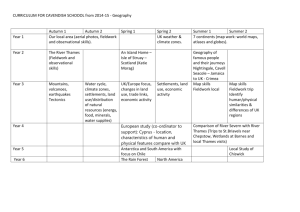
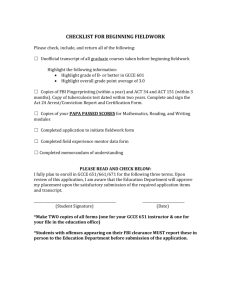
![Fieldwork Guidelines [doc]](http://s3.studylib.net/store/data/007168814_1-e9b2e04da406bf0432c39e31bfe8abff-300x300.png)
